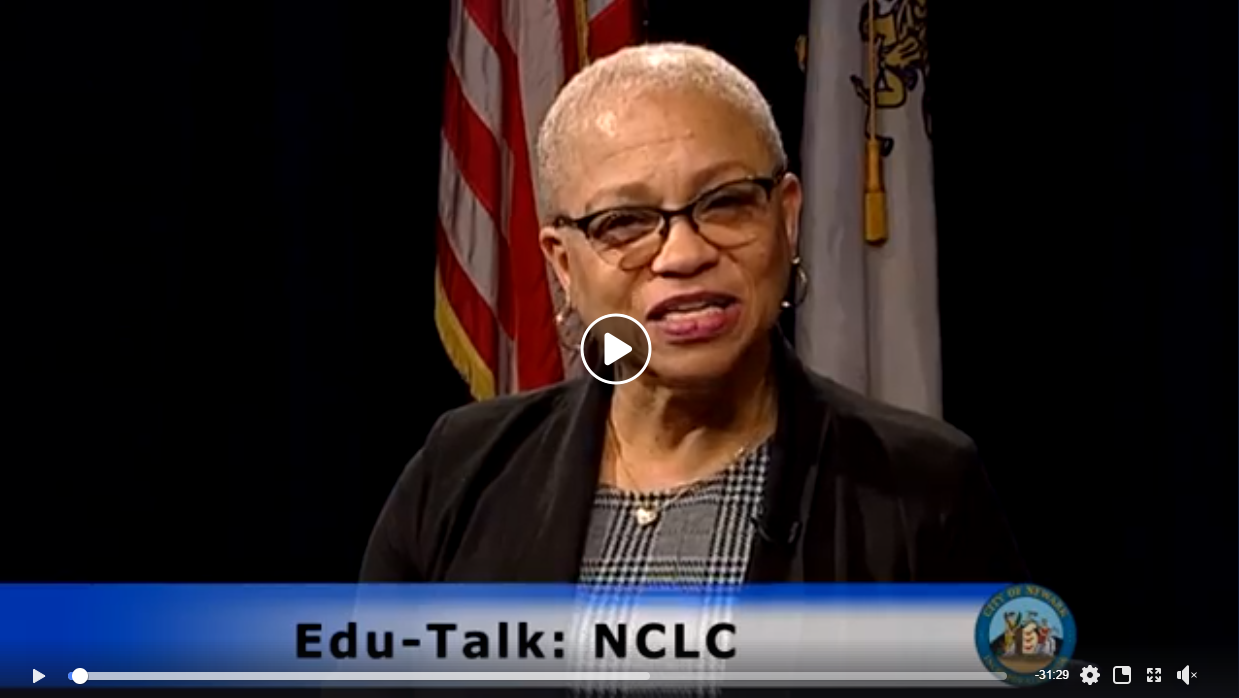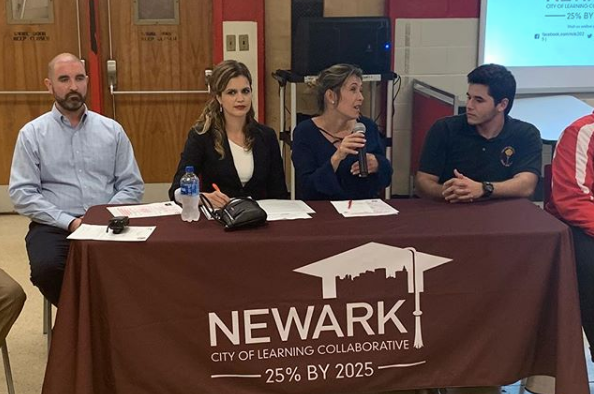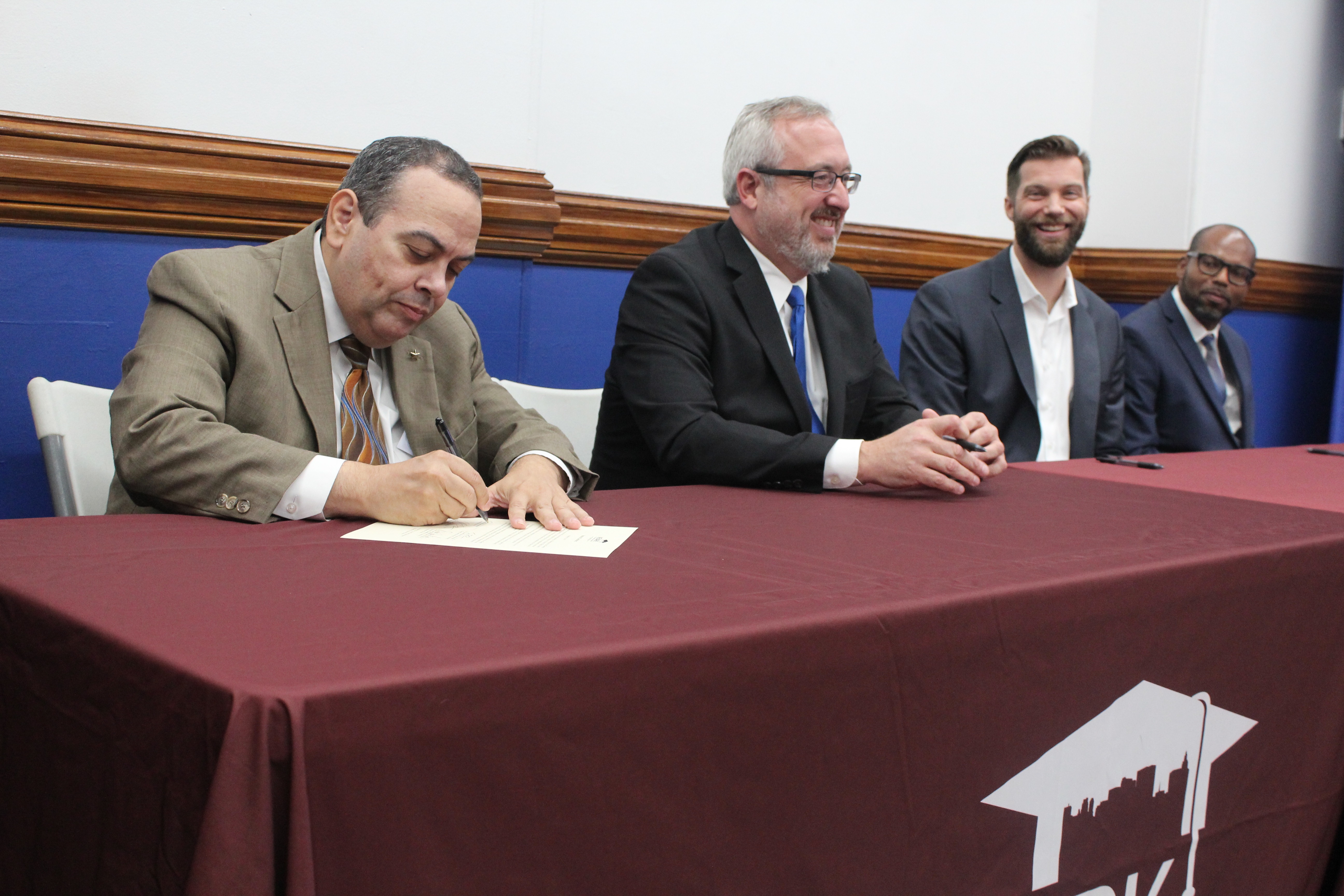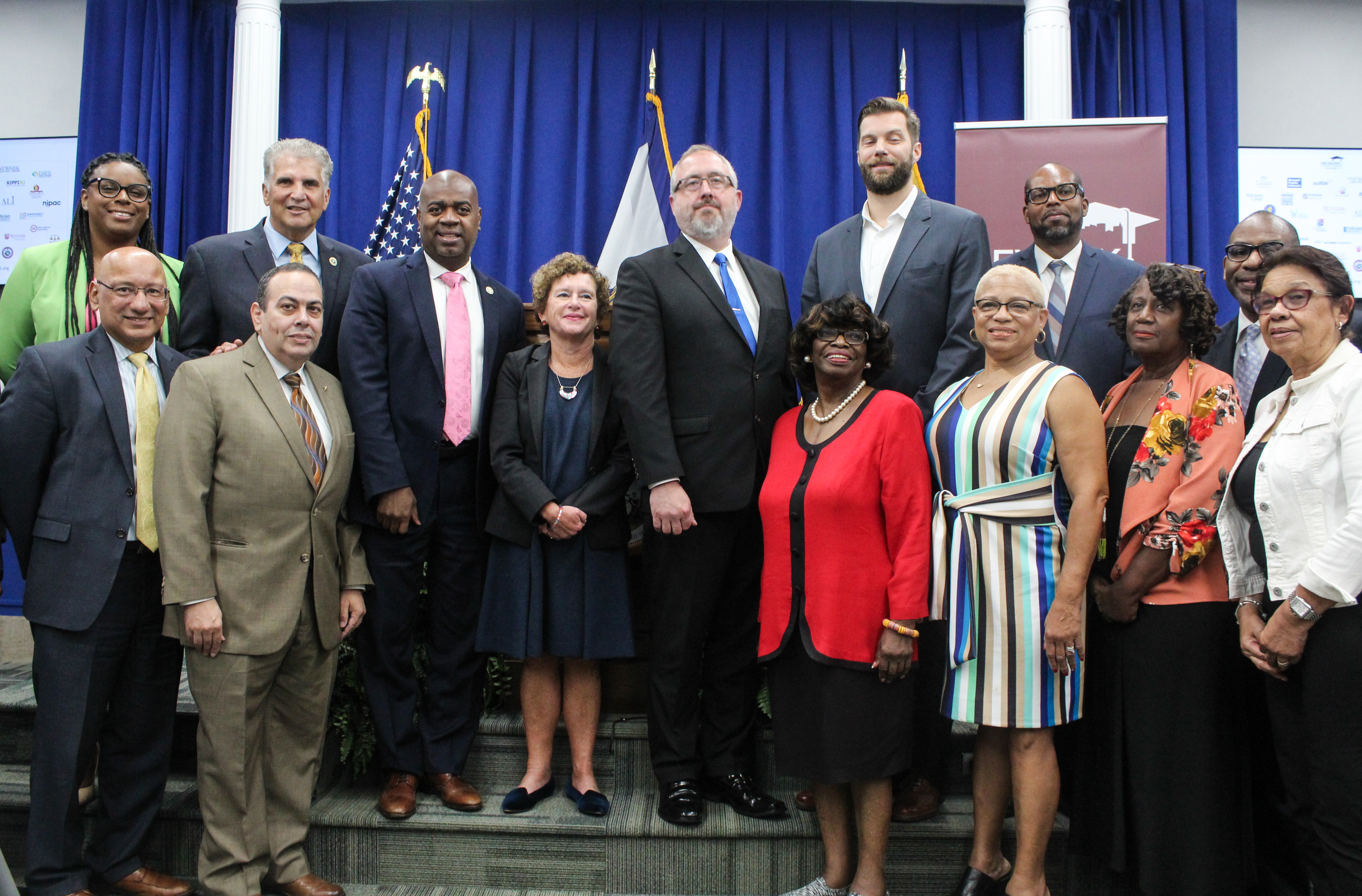
by Chanel L. Donaldson | Dec 18, 2018 | News1, Video
Chief Education Officer for the City of Newark, Antoinette Baskerville-Richardson, sits down with Executive Director of the Newark City of Learning Collaborative (NCLC), Reginald Lewis, to discuss the recently released Post-Secondary Outcomes report and learn more about how NCLC is working to build a college-going culture in Newark. From Bard High School Early College, Principal Dr. Carla Stephens and senior Becky Akinyemi also join the conversation to discuss dual enrollment as a model for expanding access to rigorous coursework and improving college readiness for Newark students.

by Chanel L. Donaldson | Oct 18, 2018 | News1
Building a college-going culture in Newark may not happen overnight, but the process is well underway, thanks to the efforts of the Newark City of Learning Collaborative (NCLC), which is conducting an ongoing series of roundtable discussions with Newark communities.
In July, Newark City of Learning Collaborative (NCLC) and Rutgers University-Newark School of Public Affairs and Administration released Post-Secondary Outcomes of Newark High School Graduates, an analysis that gives insight for the first time on college enrollment, persistence and completion for 13,500 high school graduates from 2011 until 2016. At a press conference last month, the NCLC announced its roundtable series to discuss outcomes and how to best leverage the results. The first was held on October 2 at East Side High School.
“The NCLC, City of Newark and Newark Board of Education are taking a monumental step in charting a new course for our beloved city,” said Superintendent Roger León during the press announcement. “I am a proponent of engaging the community on all issues pertaining to them – that is why this exercise is integral to the success of our students and city. We will significantly shift the trajectory upward and provide a roadmap that will profoundly impact Newark and change it forever.”
The Newark City of Learning Collaborative (NCLC) launched in January 2015 to increase the percentage of Newark residents with higher education credentials or degrees from 17 percent to 25 percent by 2025. While more students are enrolling in college, not enough students are persisting through to make it to graduation. According to the report, 54 percent of students in the sample enrolled in college by October the following year, a substantial improvement from 39 percent from a 2004-2011 grad cohort.
“The report doesn’t tell us why and it doesn’t tell us how. That’s what we’re hoping to get out of tonight’s conversation,” said Kristi Donaldson, education research and policy postdoctoral associate at NCLC, who co-authored the report. “What do we do with this? What are some of the next steps?”
The NCLC invited school leaders, educators, parents, students, and policymakers from across the city to their roundtable series to discuss the findings and brainstorm solutions to get more students to and through college.
“We want to do something with this rich information which we’ve never had prior to now. We think it’s important for all of Newark to understand what we found out,” said NCLC executive director, Reginald Lewis. “We want to figure out ways in which there can be a collective response to supporting our young people to getting in and persisting through our colleges.”
During the meeting, a speaker in the audience posed the question about how Newark can recreate a culture of going to college similar to the experience he had growing up in nearby Livingston, a suburban town a half hour away. He talked about being exposed to college campus often as early as middle school and taking the PSAT to measure college readiness and screen students for early scholarships. Efforts toward this are being made by superintendent Roger Leon when he announced last month that eighth and ninth graders are required to take the PSAT starting this October.
One way to change the culture around going to college is to adjust how students perceive and approach the college application process, suggested East Side High School student Gabriel Morgarca. “Upperclassmen can help lowerclassmen get excited about the process,” he said. “If we can get them to see that as a positive experience instead of a stressful, negative one, then I think we can help inspire this culture of success.”
The next discussion in the NCLC Roundtable Series is at Malcolm X Shabazz High School in the South Ward on October 25, 2018. All forums start at 6pm, end at 8pm, and serve dinner. The remaining roundtable dates and locations are:
- Thursday, November 1, 2018 at Central High School in the Central Ward
- Monday, November 5, 2018 at Barringer High School in the North Ward
Story submitted by Kei-Sygh Thomas, a freelance journalist based in Newark, NJ.
Photo by Kei-Sygh Thomas.
This story was originally featured at https://www.civicstory.org/civics-blog/2018/10/18/how-to-build-a-college-going-culture

by Chanel L. Donaldson | Sep 20, 2018 | News1
Mayor Ras J. Baraka, Newark Public Schools Superintendent Roger León, Newark City of Learning Collaborative (NCLC) Executive Director Reginald Lewis, Essex County Schools of Technology Superintendent Dr. James Pedersen, KIPP New Jersey Chief External Officer Ben Cope, and St. Benedict’s Prep Dean of Seniors and College Placement Didier Jean-Baptiste announced at a press conference on Wednesday, Sept. 19, the launch of public conversations throughout the city of Newark to increase the number of Newark residents with college and other post-secondary certificates by 25 percent by 2025.
NCLC is an initiative created to help build Newark’s college-going culture by ensuring that all Newarkers have the tools and resources needed to matriculate at and graduate from college. Accordingly, the citywide public conversations will address topics and issues derived from Post-Secondary Outcomes of Newark High School Graduates, a report produced by NCLC in collaboration with the Rutgers University-Newark School of Public Affairs and Administration that examines what college-going looks like for nearly 13,500 of Newark’s recent graduates. Covering approximately 85 percent of all Newark high school students who graduated between 2011 and 2016, the report examines college enrollment, persistence, and completion rates.
“The good news is that we know more Newark students are enrolling in college, but we also know that far too few are persisting to degree completion,” says NCLC Executive Director Reginald Lewis. “We hope that this report will serve as a resource to better understand the experiences of recent high school graduates.”
“As both a 22-year Newark Public Schools educator and mayor, one of my life’s greatest priorities has been to provide our youth with opportunities to advance their education after graduating from high school. The City is advancing this priority by collaborating with major partners to increase the number of Newark residents with college degrees and post-secondary certificates by 25 percent by 2025. To do so, we will talk to and listen to our residents and get their input, ideas, and concerns, in making this goal a reality. It will be attained, and our residents will be both the power behind it and the ultimate beneficiaries,” Mayor Baraka said.
At the press conference, representatives from all sectors of the K-12 spectrum (e.g., traditional public, charter, vocational technical, and private schools) also reaffirmed their unprecedented partnership and manifested their continued commitment to strengthen the high-school-to-college transition for all Newark students by signing a Statement of Commitment.
“The NCLC, City of Newark and Newark Board of Education are taking a monumental step in charting a new course for our beloved city,” said Superintendent León. “Through these community conversations, we are giving voice to the people who will help determine how soon we will become a national leader in the number of residents who are college graduates. León continued, “I am a proponent of engaging the community on all issues pertaining to them – that is why this exercise is integral to the success of our students and city. We will significantly shift the trajectory upward and provide a roadmap that will profoundly impact Newark and change it forever.”
“The cross-sector collaboration was one of the highlights of the project and enabled us to examine college-going for a wide range of Newark high school graduates. One of our goals was really to put schools in conversation – not competition – with one another to learn and share best practices throughout the community,” remarked the report’s co-author Dr. Kristi Donaldson.
The first two rounds of public discussions will take place in October as follows:
East Ward Roundtable
Tuesday, Oct. 2, 2018, 6 p.m. – 8 p.m.
East Side High School (238 Van Buren Street, Newark, NJ 07105)
West Ward Roundtable
Wednesday, Oct. 17, 2018, 6 p.m. – 8 p.m.
Jehovah-Jireh Praise & Worship Church Center (505 S. 15th Street, Newark, NJ 07103)
Click here to download a pdf of Post-Secondary Outcomes of Newark High School Graduates.
Click here for more information about NCLC.
For media coverage on the announcement, click here
To view photos from the announcement, click here
This article first appeared at https://www.newark.rutgers.edu/news/newark-city-learning-collaborative-announces-launch-public-conversations-strengthen-newarks

by Chanel L. Donaldson | Sep 19, 2018 | News1, Video
Compared to state and national rates, Newarkers have fallen behind in pursuing a college degree after high school. That’s according to study by Newark City of Learning Collaborative.
“NCLC exists due to the reality that not enough Newark residents are earning the degrees and credentials necessary to compete for viable employment in our city’s economy,” said Reginald Lewis, executive director of the organization.
The study covered the enrollment, persistence and completion rates of approximately 85 percent of all Newark high school students who graduated between 2011 and 2016. According to the study in 2017, roughly 19 percent of Newark residents earned a college degree or higher, compared to 45 percent of all New Jersey residents and 40 percent of Americans. And now the Mayor and city leaders are determine to change that with the goal of 25 percent by 2025.
“That is 25 percent of all Newark residents holding at least an associate’s degree or higher by 2025,” Lewis said.
“We just have to introduce our kids earlier to college in earlier grades and get them focused on it,” said Newark Mayor Ras Baraka.
Supporters of the study say it’s an opportunity to see what’s happening to high school students after they graduate.
“The transparency that the data provides in terms of visibility into how our kids are doing compared to other great Newark schools,” said Ben Cope, chief external officer of KIPP Charter Schools New Jersey. “It gives us a ton of insight into what we can be doing better.
Baraka says another problem is getting students to stay in college once they’ve enrolled.
“Maybe if they ran out of money, what the issues are, why kids are leaving school, leaving the university, and so we need to figure that out. It’ll help us prepare before they get there,” said Baraka.
According to the study’s “persistence findings,” 87 percent of Newark graduates who immediately enrolled in college returned for the next college term, and only 64 percent of students who immediately enrolled in college continued through the second year.
“When I was in high school, a lot of people wanted to drop out because they didn’t find the need to go to school, to go to college to get a job that they could get right after high school, like for example working in construction,” said Erika Baque, a 2016 Montclair State Graduate and a participant in the study.
“I just heard this morning a student lost her mom and said, ‘I don’t know if I can continue, I’ve got to come home and help the family find money for the funeral and then I’ve got to figure out how to find an income to provide for the rest of my household.’ So we see a lot of social, emotional and a lot of financial reasons why students are persisting and that’s our biggest challenge,” Cope said.
The NCLC says it will now hold public conversations in all five wards of the city to get more students in college and to make sure they stay there.
This article originally appeared at https://www.njtvonline.org/news/video/newark-looks-to-dramatically-increase-percentage-of-college-graduates-by-2025/
by Chanel L. Donaldson | Sep 12, 2018 | News1
Join the Newark City of Learning Collaborative (NCLC) and Mayor Ras Baraka on Wednesday, September 19, 2018 at 10:00 am at Newark City Hall for the official press release event for Post-Secondary Outcomes of Newark High School Graduates. School leaders, educators, parents, and policymakers from across the city are invited to learn more about the launch of a public conversation to evaluate and strengthen the high school to college transition for all Newark students. The press event will feature remarks for Mayor Ras Baraka; NCLC Executive Director, Reginald Lewis; Superintendent of Newark Public Schools, Roger León; Superintendent of Essex County Schools of Technology, Dr. James Pedersen; and Dean of Seniors and College Placement at St. Benedict’s Prep, Didier Jean-Baptiste. Community roundtables in each of Newark’s five wards are scheduled to take place this fall to continue the conversation.
About the Report
Post-Secondary Outcomes of Newark High School Graduates is an analysis of what college-going looks like for nearly 13,500 of Newark’s recent graduates. Housed at the Joseph C. Cornwall Center for Metropolitan Studies, NCLC is working to build Newark’s college-going culture by ensuring that all Newarkers have the tools and resources needed to get to and through college. The report was produced in collaboration with the Rutgers University-Newark School of Public Affairs and Administration. Covering approximately 85 percent of all Newark high school students who graduated between 2011 and 2016, the report examines college enrollment, persistence, and completion rates.
Download a pdf of the full report here.
Click here or more information about Post-Secondary Outcomes.
Click here for more information about NCLC.




